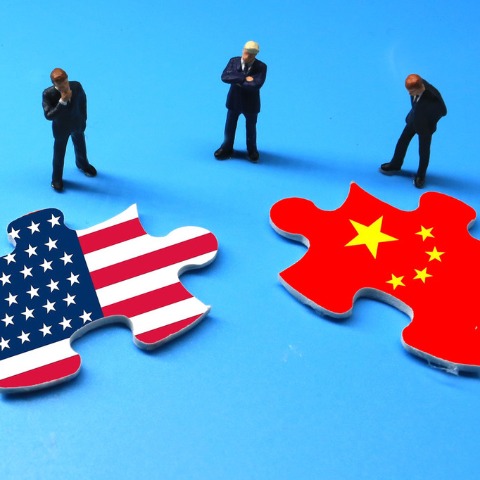



Chinese and US companies should utilize the ample room that is available for collaboration in the coming years, particularly in the fields of supply chain development and green industries, US business leaders said on Wednesday.
Greg Gilligan, chairman of the American Chamber of Commerce in China, or AmCham China, said the chamber's member companies will promote collaboration between Chinese and US companies, and help US companies to further integrate into local supply chains to expand their presence in China.
US companies operating in China will receive guidance on how to further involve in the dual-circulation development paradigm and promote sustainable development as outlined in China's 14th Five-Year Plan (2021-25).
Under the dual-circulation model, the domestic market is the mainstay while the domestic and foreign markets reinforce each other.
"We should not allow a trend toward partial decoupling to become broad decoupling. We believe business and government need to work closely to keep the lanes for commerce and trade as broad as possible," he said.
Foreign trade between China and the United States soared 23.4 percent year-on-year to 3.95 trillion yuan ($618.2 billion) from January to October this year, accounting for 12.5 percent of China's total volume of exports and imports, data from the General Administration of Customs showed.
In addition to offering business insights to Chinese business partners, AmCham China will encourage its member companies to build more partnerships with China's small and medium-sized enterprises, Gilligan said.
Furthermore, companies both in China and the US can increase growth opportunities by forging deals at the regional level, he said.
AmCham China is a nonprofit, nongovernmental organization whose membership comprises 4,000 individuals from 900 companies, including Coca-Cola, Pfizer, Qualcomm, Honeywell, Walmart and Dell Technologies, operating across China.
Other US corporate executives said greater market openness will continue to have a positive impact on sustainable socioeconomic growth in China, and help revitalize the global economy, address climate change and improve the multilateral trading environment.
After launching a direct air cargo service route between Shenzhen, Guangdong province, to Ho Chi Minh City, Vietnam, late last year, United Parcel Service Inc, the US package delivery company, added another air freight route between Shenzhen and Osaka, Japan, in July to serve the growing trade volume in Asia. The service operates five times a week.
China's growing trade volume has not only provided opportunities for players in the logistics sector, but also encouraged them to help ensure the reliable connectivity of China's market with other parts of the world, said Michelle Ho, UPS president for the Asia-Pacific region and a fourth-time exhibitor at the China International Import Expo held in Shanghai.
China has continued to deepen reform and opening-up, creating a fairer and better business environment for multinational companies operating in the country. The nation saw foreign direct investment surge 25.2 percent year-on-year to $129.26 billion in the first three quarters of this year, data from the Ministry of Commerce showed.
"As one of the world's largest consumer markets, we see sufficient resilience and great potential in the Chinese economy, bringing tremendous opportunities for global development, as well as our brands," said Yann Bozec, president of Tapestry Asia-Pacific, the parent company of US brands such as Coach, Kate Spade and Stuart Weitzman.
"To ensure that we stay relevant in such a dynamic market, we are accelerating our localization process, actively promoting consumer upgrades and digital innovation," said Bozec, who is also the president and CEO of Coach China.
Supported by big platforms such as the CIIE and Hainan Free Trade Port, China will remain a vital driving force for global prosperity.
The country's great potential and the passion of its consumer market will continue to inspire global companies to keep investing and innovating in this market, said Zhang Yansheng, chief researcher at the China Center for International Economic Exchanges.
If you have any problems with this article, please contact us at app@chinadaily.com.cn and we'll immediately get back to you.